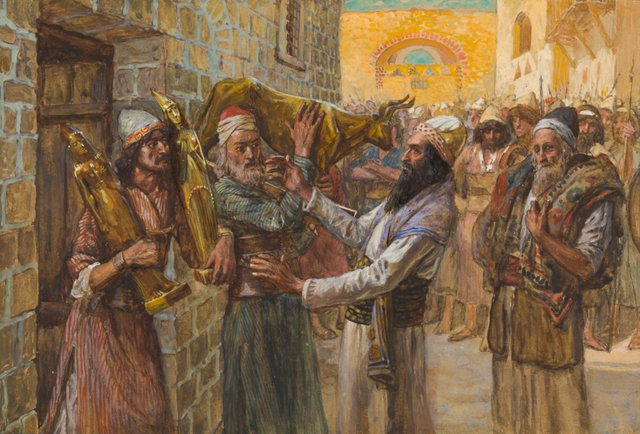
In the last article, we looked at the structure of the Book of Judges, and I suggested that the Period of the Judges depicted in that book preceded the Conquest of Canaan by Joshua and the Israelites. In this article we are going to examine one of the episodes from Judges that may support this hypothesis.
The last five chapters of the Book of Judges constitute an epilogue. Chapters 19-21 recount the story of a Levite and his concubine. Before this, Judges 17-18 tell the story of The Idolatry of Micah and the Migration of the Danites. It is this tale that we will investigate in this article.
The Idolatry of Micah
The story of the Idolatry of Micah is recounted in Judges 17:
And there was a man of mount Ephraim, whose name was Micah. And he said unto his mother, The eleven hundred shekels of silver that were taken from thee, about which thou cursedst, and spakest of also in mine ears, behold, the silver is with me; I took it. And his mother said, Blessed be thou of the Lord, my son. And when he had restored the eleven hundred shekels of silver to his mother, his mother said, I had wholly dedicated the silver unto the Lord from my hand for my son, to make a graven image and a molten image: now therefore I will restore it unto thee. Yet he restored the money unto his mother; and his mother took two hundred shekels of silver, and gave them to the founder, who made thereof a graven image and a molten image: and they were in the house of Micah. And the man Micah had an house of gods, and made an ephod, and teraphim, and consecrated one of his sons, who became his priest. In those days there was no king in Israel, but every man did that which was right in his own eyes.
And there was a young man out of Bethlehemjudah of the family of Judah, who was a Levite, and he sojourned there. And the man departed out of the city from Bethlehemjudah to sojourn where he could find a place: and he came to mount Ephraim to the house of Micah, as he journeyed. And Micah said unto him, Whence comest thou? And he said unto him, I am a Levite of Bethlehemjudah, and I go to sojourn where I may find a place. And Micah said unto him, Dwell with me, and be unto me a father and a priest, and I will give thee ten shekels of silver by the year, and a suit of apparel, and thy victuals. So the Levite went in. And the Levite was content to dwell with the man; and the young man was unto him as one of his sons. And Micah consecrated the Levite; and the young man became his priest, and was in the house of Micah. Then said Micah, Now know I that the Lord will do me good, seeing I have a Levite to my priest. (Judges 17)
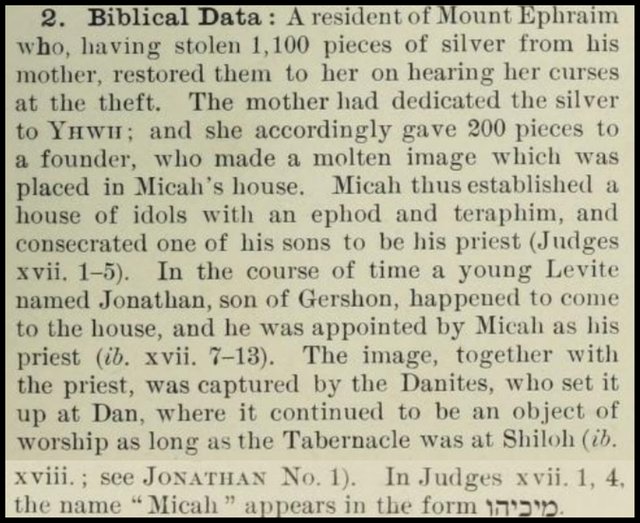
The second part of the story, the Migration of the Danites, is longer and is recounted in Judges 18:
In those days there was no king in Israel: and in those days the tribe of the Danites sought them an inheritance to dwell in; for unto that day all their inheritance had not fallen unto them among the tribes of Israel. And the children of Dan sent of their family five men from their coasts, men of valour, from Zorah, and from Eshtaol, to spy out the land, and to search it; and they said unto them, Go, search the land: who when they came to mount Ephraim, to the house of Micah, they lodged there. When they were by the house of Micah, they knew the voice of the young man the Levite: and they turned in thither, and said unto him, Who brought thee hither? and what makest thou in this place? and what hast thou here? And he said unto them, Thus and thus dealeth Micah with me, and hath hired me, and I am his priest. And they said unto him, Ask counsel, we pray thee, of God, that we may know whether our way which we go shall be prosperous. And the priest said unto them, Go in peace: before the Lord is your way wherein ye go.
Then the five men departed, and came to Laish, and saw the people that were therein, how they dwelt careless, after the manner of the Zidonians, quiet and secure; and there was no magistrate in the land, that might put them to shame in any thing; and they were far from the Zidonians, and had no business with any man. And they came unto their brethren to Zorah and Eshtaol: and their brethren said unto them, What say ye? And they said, Arise, that we may go up against them: for we have seen the land, and, behold, it is very good: and are ye still? be not slothful to go, and to enter to possess the land. When ye go, ye shall come unto a people secure, and to a large land: for God hath given it into your hands; a place where there is no want of any thing that is in the earth. And there went from thence of the family of the Danites, out of Zorah and out of Eshtaol, six hundred men appointed with weapons of war. And they went up, and pitched in Kirjathjearim, in Judah: wherefore they called that place Mahanehdan unto this day: behold, it is behind Kirjathjearim. And they passed thence unto mount Ephraim, and came unto the house of Micah.
Then answered the five men that went to spy out the country of Laish, and said unto their brethren, Do ye know that there is in these houses an ephod, and teraphim, and a graven image, and a molten image? now therefore consider what ye have to do. And they turned thitherward, and came to the house of the young man the Levite, even unto the house of Micah, and saluted him. And the six hundred men appointed with their weapons of war, which were of the children of Dan, stood by the entering of the gate. And the five men that went to spy out the land went up, and came in thither, and took the graven image, and the ephod, and the teraphim, and the molten image: and the priest stood in the entering of the gate with the six hundred men that were appointed with weapons of war. And these went into Micah's house, and fetched the carved image, the ephod, and the teraphim, and the molten image. Then said the priest unto them, What do ye? And they said unto him, Hold thy peace, lay thine hand upon thy mouth, and go with us, and be to us a father and a priest: is it better for thee to be a priest unto the house of one man, or that thou be a priest unto a tribe and a family in Israel? And the priest’s heart was glad, and he took the ephod, and the teraphim, and the graven image, and went in the midst of the people.
So they turned and departed, and put the little ones and the cattle and the carriage before them. And when they were a good way from the house of Micah, the men that were in the houses near to Micah’s house were gathered together, and overtook the children of Dan. And they cried unto the children of Dan. And they turned their faces, and said unto Micah, What aileth thee, that thou comest with such a company? And he said, Ye have taken away my gods which I made, and the priest, and ye are gone away: and what have I more? and what is this that ye say unto me, What aileth thee? And the children of Dan said unto him, Let not thy voice be heard among us, lest angry fellows run upon thee, and thou lose thy life, with the lives of thy household. And the children of Dan went their way: and when Micah saw that they were too strong for him, he turned and went back unto his house.
And they took the things which Micah had made, and the priest which he had, and came unto Laish, unto a people that were at quiet and secure: and they smote them with the edge of the sword, and burnt the city with fire. And there was no deliverer, because it was far from Zidon, and they had no business with any man; and it was in the valley that lieth by Bethrehob. And they built a city, and dwelt therein. And they called the name of the city Dan, after the name of Dan their father, who was born unto Israel: howbeit the name of the city was Laish at the first. And the children of Dan set up the graven image: and Jonathan, the son of Gershom, the son of Manasseh, he and his sons were priests to the tribe of Dan until the day of the captivity of the land. And they set them up Micah’s graven image, which he made, all the time that the house of God was in Shiloh. (Judges 18)
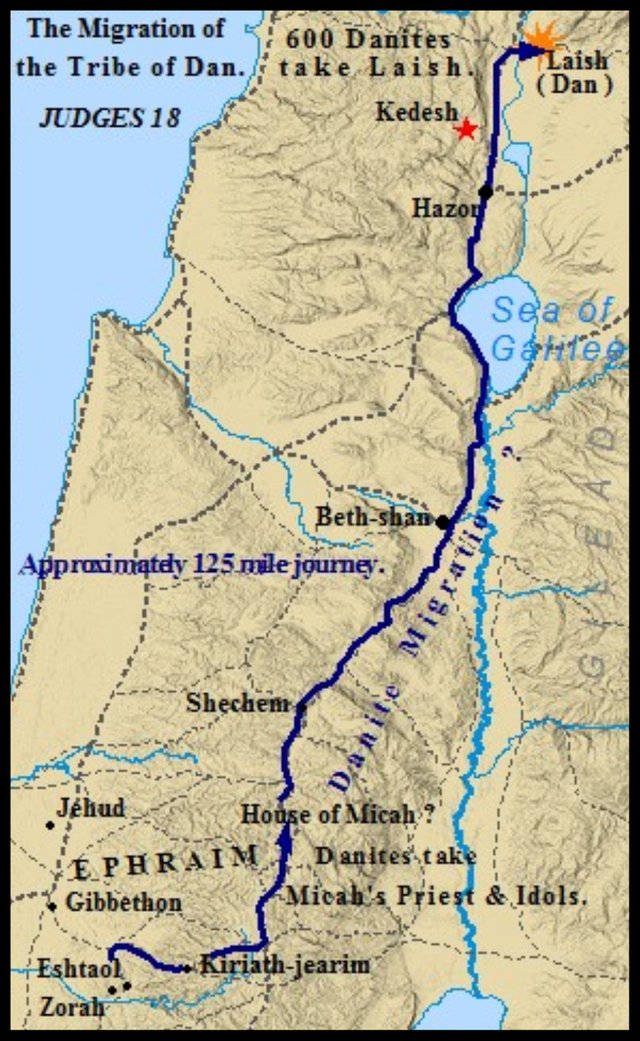
Textual Analysis
Even a cursory reading of this tale reveals several inconsistencies.
In 17:1-4, Micah is spelled מיכיהו, but thereafter the spelling is מיכה. The story of Micah and his mother seems to be a separate story from that of Micah and his Idols.
17:4 mentions a graven image and a molten image, but in 18:30 only the graven image is set up in Dan.
In 17:5, Micah consecrates one of his sons as his priest, but in 17:7-13, a Levite from Bethlehem in Judah is hired by Micah to be his priest. Micah asks the Levite to be a father unto him, but the Levite is then described as being unto him as one of his sons. In Judges 17, the identity of the Levite is not revealed. In 18:30, however, we are told his name and lineage. Finally, note how 17:5 is separated from 17:7-13 by the characteristic refrain of the Book of Judges: “In those days there was no king in Israel, but every man did that which was right in his own eyes.” This is used throughout the book as a sort of punctuation mark, indicating the end of a passage. This suggests that Judges 17 was created from multiple sources.
In 17:7, the Levite is described as sojourning there. But there cannot refer to Bethlehem, as the verb to sojourn means to dwell as an outsider or an alien, not to dwell in one’s native town. In 17:8, however, the Levite is described as leaving Bethlehem and wandering to Mount Ephraim.
In 18:2, the five Danite spies lodge in Micah’s house. But in 18:3, they hear and recognize the voice of the Levite as they are passing Micah’s house and this is what leads them to enter. We never learn how the Danites came to be acquainted with a Levite from Judah.
In 18:17, the five Danites enter Micah’s house and take his idols. In the very next verse, however, this same event is described a second time. Then, in 18:20, it is the Levite who takes the idols.
18:2-10 and 18:11-28 appear to be two versions of the same episode, with several parallel passages in common. For example, we are told twice (18:7 and 18:27-28) that the inhabitants of Laish were quiet and secure, lived carelessly far from Zidon, and had no business with other men.
18:30 and 18:31 are mutually contradictory. The Tabernacle, or Tent of Meeting, which housed the Ark of the Covenant before the building of the Temple of Solomon, was established at Shiloh after the Conquest of Canaan (Joshua 18:1). The Ark was taken from Shiloh at the beginning of the Judgeship of Samuel (1 Samuel 4-7). This was centuries before the so-called Assyrian Captivity, when the Kingdom of Israel was destroyed and its population carried off into exile.
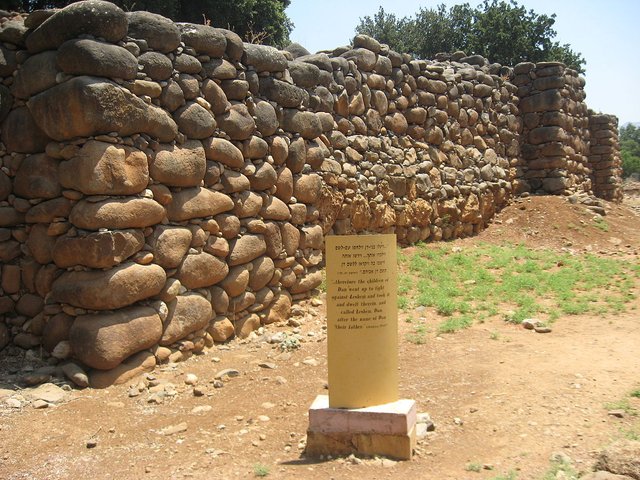
Modern Critical View
In the Jewish Encyclopedia, the historicity of the account is not doubted:
The narrative of Micah’s idol, the historical basis of which is undoubted, was apparently written with the object of showing the origin of the temple of Dan (comp. I Kings xii. 29). (Singer 533)
I Kings 12:29 recounts how Jeroboam, the first King of Israel after the death of Solomon, set up an idol—a golden calf—in the city of Dan. II Chronicles 13:8 refers to the same incident.
Critical analysis of the text has led to various interpretations:
According to Oort, Wellhausen, and Kuenen, the text has received many interpolations, with the object of throwing contempt upon the cult of Dan. On the other hand, Vatke ... and Berthau, followed by other critics, recognize two parallel narratives united by a redactor. While there is some disagreement as to the component parts of the two versions, Budde’s division seems to be the most acceptable; he holds, namely, that the first narrative consists of Judges xvii. 1, 5, 8-11a, 12, beginning, 13; xviii. 1, part of 2, 3b, 4b-6, 8-10, part of 11, 12, part of 13, 14, 16, 18a, 19-29, 31; and that the intervening verses form the second narrative. Budde is of opinion that the first narrative belongs to E; but he does not find sufficient grounds for ascribing the second to J. Moore thinks that the first version belongs to J. In the second version (ib. xviii. 30) the cult at Dan is indicated as having lasted “till the day of the captivity of the land,” which is supposed by Moore to refer to the deportation by Tiglath-pileser (734 B.C.). (Singer 534)
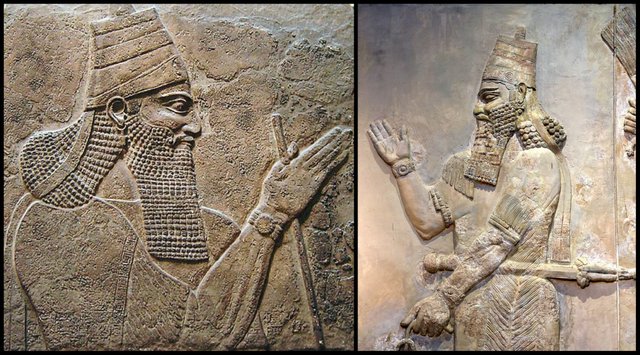
As we have seen, the reference in 18:30 to the cult at Dan lasting “till the day of the captivity of the land” is contradicted by the next verse, which says that it existed “all the time that the house of God was in Shiloh:”
31: This verse does not fit the one that precedes it. Shiloh was destroyed in the days of Samuel (1 Samuel 4-5), more than 300 years before the Assyrian invasion. It seems that this verse is an editorial addition, introduced to connect the story with the book of Samuel, which begins with the temple of Shiloh (1 Sam. ch 1). (Berlin & Brettler 550)
An alternative explanation of this apparent contradiction emends the phrase “till the day of the captivity of the land” to “till the deportation of the Ark”. This requires the word הארץ [ha erets = the land] in 18:30 to be emended to הארן [ha aron = the Ark] (Strong 16-17).
Traditional Commentary
Over the centuries, Jewish scholars have also had their say on the correct interpretation of this episode, but with little consensus ever being reached on the matter. One point of contention concerns the identity of the priest appointed by the Danites to be their first priest. In Judges 18:30, we are told that this was Jonathan, the son of Gershom and the grandson of Manasseh. Gershom, however, was a son of Moses. Manasseh was the name of a son of Joseph and a King of Judah. This has led some rabbinical scholars to surmise that Manasseh is a deliberate error for Moses:
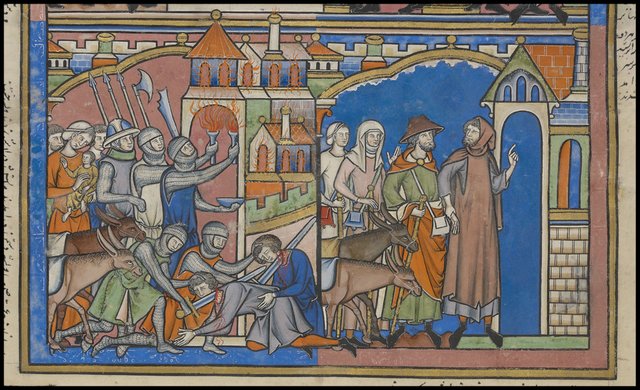
In Shoftim [Judges] 18:30, we are presented with an incident of idolatry practiced by the tribe of Dan surrounding the idol of Micah. “The Danites set up the sculptured image for themselves; and Yehonatan son of Gershom son of Menashe, and his descendants, served as priests to the Danite tribe until the land went into exile.” There is a curious scribal tradition that, in spelling the name Menashe, the nun is superscript, written at a level higher than the rest of the word. Rashi, and indeed many classical commentaries, record that the reason it is written that way is because the nun did not belong and that the name of the priest’s grandfather was Moshe who indeed had a son named Gershom, but out of respect for our greatest teacher, we call him Menashe in this instance. (Almog & Almog 2)
Rabbi Rashi argued that this episode (and the following one in Judges 19-21) took place near the beginning of the Period of the Judges:
There was a man from Mount Ephraim: Although both incidents are recorded at the conclusion of this book, the episodes of Michah and the concubine at Givoh took place at the beginning of the period of Judges, during the days of Asniel ben Kenaz, as it is said, “They appointed, for themselves, the figure of Michah, etc., during the entire period of the Mishkon at Shiloh.” We learn that, throughout the period of Shiloh, the graven figure of Michah was in existence. Concerning the concubine at Givoh, it is said, about Yevus of Jerusalem, “Let us not turn to an alien city” [and so] we learn that Jerusalem had not yet been conquered. (Rashi)
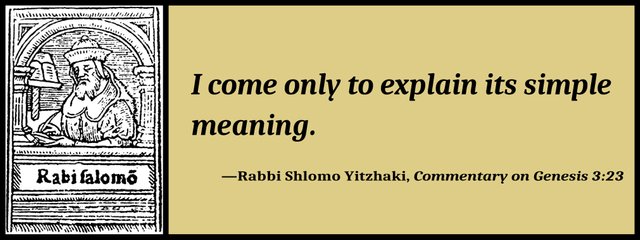
By making Micah—an idolater—a contempory of Moses, some Rabbis concluded that he was the founder of the Golden Calf. A legend recorded by Louis Ginzberg includes this detail, which would place the episode of Micah’s Idols near the beginning of the Period of the Judges. But other details in this legend place the episode near the end of the Period of the Judges:
A part of the money which Delilah received from the Philistine lords as the price of Samson’s secret, she gave to her son Micah, and he used it to make an idol for himself. This sin was the more unpardonable as Micah owed his life to a miracle performed by Moses. During the times of the Egyptian oppression, if the prescribed number of bricks was not furnished by the Israelites, their children were used as building material. Such would have been Micah’s fate, if he had not been saved in a miraculous way. Moses wrote down the Name of God, and put the words on Micah’s body. The dead boy came to life, and Moses drew him out of the wall of which he made a part. Micah did not show himself worthy of the wonder done for him. Even before the Israelites left Egypt, he made his idol, and it was he who fashioned the golden calf. At the time of Othniel the judge he took up his abode at a distance of not more than three miles from the sanctuary at Shiloh, and won over the grandson of Moses to officiate as priest before his idol. (Ginzberg 4:49-50)
Here, Micah is a child in Egypt before the Exodus and a son of Delilah, the woman who betrays Samson, the last Judge of Israel before Eli and Samuel. If we accept all of this, then Micah lived both before the Exodus and after the Judgeship of Samson. This seems to imply that no more than a generation elapsed between the Exodus and the Monarchy. Micah is also said to have lived during the Judgeship of Othniel, the first Judge of Israel.
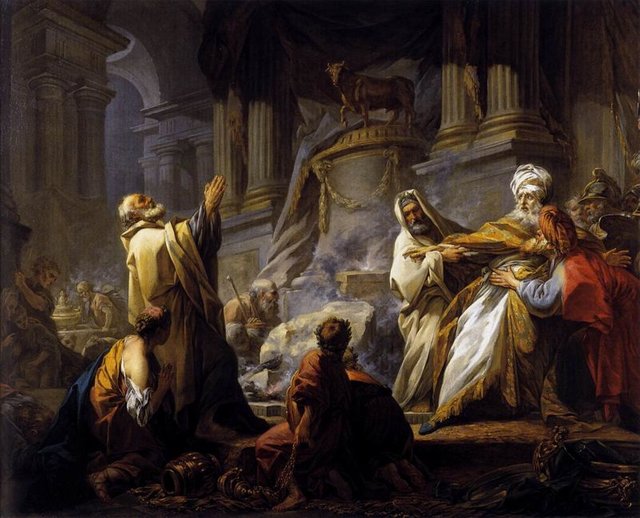
Jeroboam
As we have seen, I Kings 12:29 and II Chronicles 13:8 attribute the foundation of the idols of Dan to Jeroboam. Influenced, no doubt, by this tradition, some rabbinical scholars identified Micah with Nebat the father of Jeroboam. It is impossible to square this with the traditional chronology of the Bible. Even if we place the episode of Micah’s Idolatry at the end of the Period of the Judges, it is still separated from the accession of Jeroboam by the Judgeship of Eli (40 years), the Judgeship of Samuel (11 years), the reign of Saul (2 years), the reign of David (40 years) and the reign of Solomon (40 years)—over 130 years in total. One way of reconciling these two timelines is to place the beginning of Jeroboam’s reign shortly after the Conquest of Canaan. This may require us to reject this historicity of Eli, Samuel, David and Solomon and to move the Period of the Judges to before the Conquest.
Who set up the idols in Dan? Danite contemporaries of Micah? Or Jeroboam? The two narratives can only be reconciled if the timeline from the Exodus to the establishment of the Kingdom of Israel is greatly compressed. We cannot even accept the chronology of Biblical maximalists like Kenneth A Kitchen, who dates the Exodus to 1270-1260 BCE and the beginning of Jeroboam’s reign to 931-930 BCE.
In the timeline of the Short Chronology which I am reconstructing, the Conquest is tentatively dated to 760 BCE and the Fall of Jerusalem to 343 BCE. (In this model, Nebuchadnezzar King of Babylon is identified with the Persian Emperor Artaxerxes III.) This leaves only 417 years for the rest of the history of ancient Israel. In the conventional chronology, the Kingdom of Judah is assigned about 344 years—from 930-586 BCE. If we accept this duration as accurate, that leaves about 70 years between the Conquest and the establishment of the Kingdoms of Israel and Judah in which to fit the Period of the Judges, Eli, Samuel, Saul, David and Solomon. Clearly, the historicity of some of these must be set aside, or the judgeships and reigns must be greatly curtailed. Perhaps a combination of the two will be necessary to tie everything together.
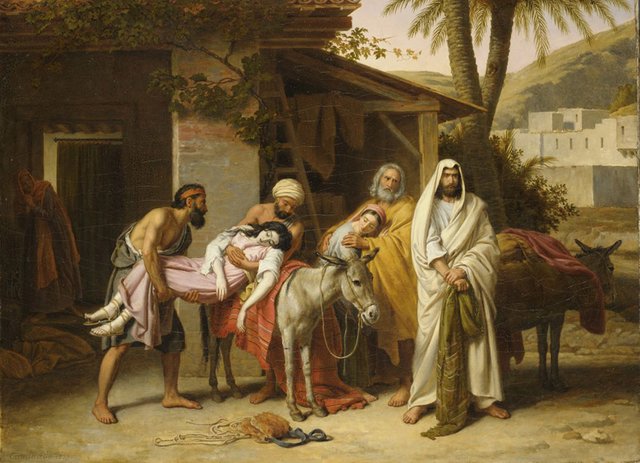
Clearly, there is still a lot to unwrap here. But before we can do so we must take a closer look at the other episode, The Levite of Ephraim and His Concubine, which is recounted in Judges 19-21. And that is what we will do in the next article in this series.
And that’s a good place to stop.
References
- Rabbi David Almog & Lisa Bennett Almog, Moshe’s Unique Prophecy, Kol Chovevei Torah, Volume 1, Issue 3, Pages , Yeshivat Chovevei Torah Rabbinical School, New York (2006)
- Adele Berlin & Marc Zvi Brettler (editors), The Jewish Study Bible, Jewish Publication Society TANAKH Translation, Oxford University Press, Oxford (1999)
- Karl Budde, Die Bücher Richter und Samuel, ihre Quellen und ihr Aufbau [The Books of Judges and Samuel: Their Sources and Structure], J Ricker’sche Buchhandlung, Gießen (1890)
- Louis Ginzberg, The Legends of the Jews, Volume 4, Translated from the German by Henrietta Szold, The Jewish Publication Society of America, Philadelphia (1913)
- Louis Ginzberg, The Legends of the Jews, Volume 6, Translated from the German by Henrietta Szold, The Jewish Publication Society of America, Philadelphia (1928)
- Kenneth A Kitchen, On the Reliability of the Old Testament, William B Eerdmans Publishing Company, Grand Rapids MI (2003)
- Isidore Singer (managing editor), The Jewish Encyclopedia, Volume 8, Funk & Wagnalls Co, New York (1904)
- James Strong, Hebrew and Chaldee Dictionary, in The Exhaustive Concordance of the Bible, Eaton & Mains, New York (1890)
Image Credits
- The Idols Are Brought Out (Judges 18:18): James Jacques Joseph Tissot (designer), Michel Simonidy (artist), The Jewish Museum, New York, Public Domain
- The Migration of the Danites: © Israel-a-history-of.com, Fair Use
- The City Wall of Dan: © Yuval Mendelson (photographer), Creative Commons License
- Tiglath-Pileser III: British Museum WA 118900, London, Public Domain
- Sargon II: The Iraq Museum, Baghdad, © Osama Shukir Muhammed Amin FRCP (Glasgow) (photographer), Creative Commons License
- The Danites Sack Laish (Left): The Crusader Bible, MS M.638 Folium 15v, Pierpont Morgan Library & Museum, New York, Public Domain
- Rashi (Rabbi Shlomo Yitzhaki): Anonymous Woodcut, Guillaume de Paris, Postillae Maiores Totius Anni cum Glossis et Quaestionibus, Lyon (1539), Public Domain
- Jeroboam Sacrificing to Idols (Fragonard): Jean-Honoré Fragonard (artist), Beaux-Arts de Paris PRP 7, Paris, Jirayr 92 (photographer), Public Domain
- The Levite of Ephraim and His Concubine: Alexandre-François Caminade (artist), Musée des Beaux-Arts de Lyon, Lyon, Alain Basset (photographer), Public Domain
